Tuesday, September 14th, 2021 – The teams of the United States of America and Russia will battle it out tomorrow (UTC 16.30) for the gold medals in the 2021 edition of the Online Chess Olympiad.
Russia was the first team to advance to the final this afternoon by defeating China in two close six-board matches, while the USA qualified by besting last year’s co-winner India in the tiebreaks, after the two regular matches ended in a win apiece.
Both teams arrive in top form after nearly a month of competition, in which teams from 155 countries have played each other in a novel pool-structured system, ending in a knockout playoff.
Before the Olympiad began, Russian President Vladimir Putin sent a greetings letter to all the countries participating in FIDE’s most universally recognised chess event.
Semi-finals I
Team USA advanced to the final after defeating, not without much difficulty, team India in the tiebreaks. The achievement is outstanding: after being crushed 5-1 in the first match, they managed to regain focus and win the second match by 4-2 to prevail in the blitz tiebreaks 4½-1½.
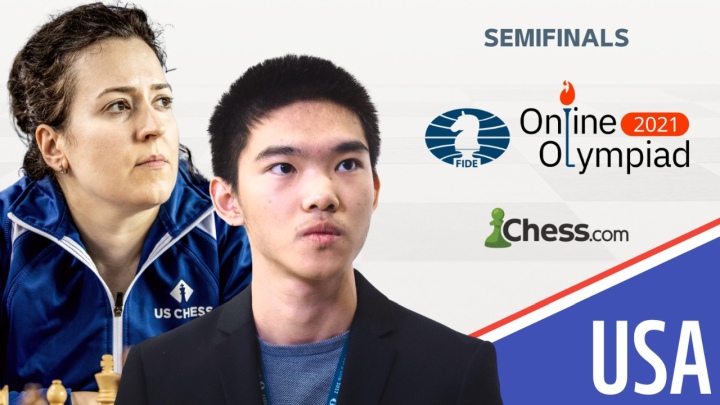
In match one, Jeffrey Xiong uncorked an interesting novelty (10…Qa3 instead of 10…Qxc2) against Vishy Anand in a fashionable line of the Caro-Kan. The engines are not impressed, but the American was doing very well until he lost his way in the ending.
Meanwhile, on board two, Pentala Harikrishna, with Black, reached the following position against Dariusz Swiercz.
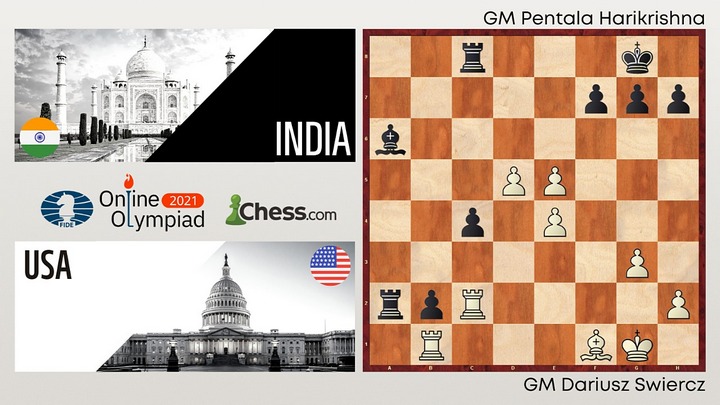
The Indian GM played the strong 41…c3! 42.Bxa6 and now the startling 42…Ra1! winning. After 43.Bxc8 Rxb1+ 44.Kg2 Rg1+, White resigned a few moves later.
However, in the second match, the Americans made a huge comeback. Xiong took his revenge against Anand in a nice positional game, while Vidit overplayed an equal position with White against Ray Robson and ended up losing.
Harika levelled the score by defeating Paikidze with a strong attack, but in the key game, the USA tipped the balance in its favour when Awonder Liang took advantage of a mistake by Praggnanandhaa in the ending to win a pawn and the point.
It all went down to the blitz tiebreaks. In a risky move, India decided to replace Anand with Adhiban, a very dangerous blitz player, well known for his attacking skills. Nihan Sarin came in for Praggnanandhaa, the substitution that India had been doing in every match. Meanwhile, the USA fielded the same team as the second match, and their strategy paid off, as they won 4½-1½.
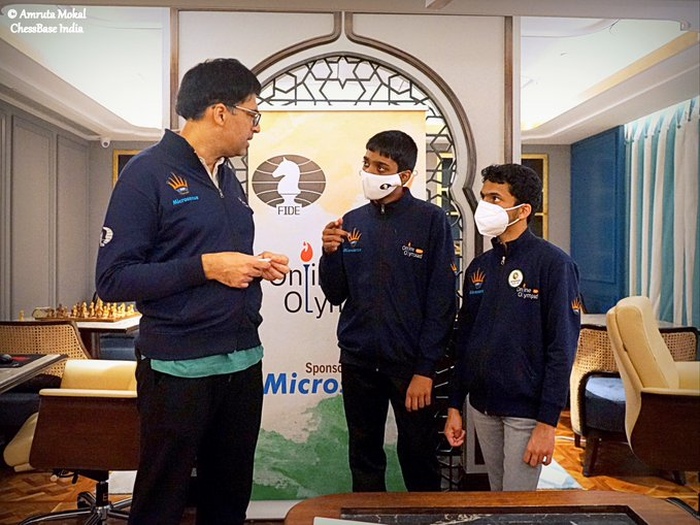 Prag and Nihal Sarin kibitzing with “the king” Anand – Photo: Amruta Mokal
Prag and Nihal Sarin kibitzing with “the king” Anand – Photo: Amruta Mokal
On board one, Harikrisna went all out against Xiong but fell to the young American’s sharp counterattack. On board two, Ray Robson converted the advantage of two minor pieces against a rook against Adhiban.
On board three, Irina Krush defended solidly against Humpy Koneru’s two bishops and took home the point when the Indian missed a tactic and dropped her queen. On board four, Harika chalked up her third straight point but to no avail.
India did have some connection problems on board six – Vaishali was clearly winning when her time ran out – but the match was lost in any case.
Semi-finals II
The other finalist of the day was Russia, who defeated China in both semi-final matches by 3½-2½ and then 4-2.
In the first match, the three evenly-rated top boards ended in draws, but Alexandra Kosteniuk – recently crowned Women’s World Cup Champion – won the first of her two games against Ju Wenjun, who up to that moment had performed spectacularly in the event.
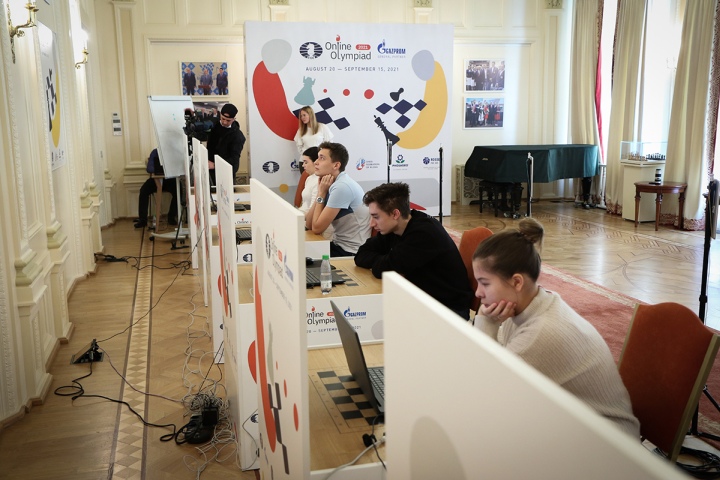 Team Russian in action – Photo: Eteri Kublashvili – Russian Chess Federation
Team Russian in action – Photo: Eteri Kublashvili – Russian Chess Federation
China did miss an opportunity on board two. In the diagram, Yu Yangyi, playing Black, has a queen for a rook and a knight, but his opponent does have drawing chances.
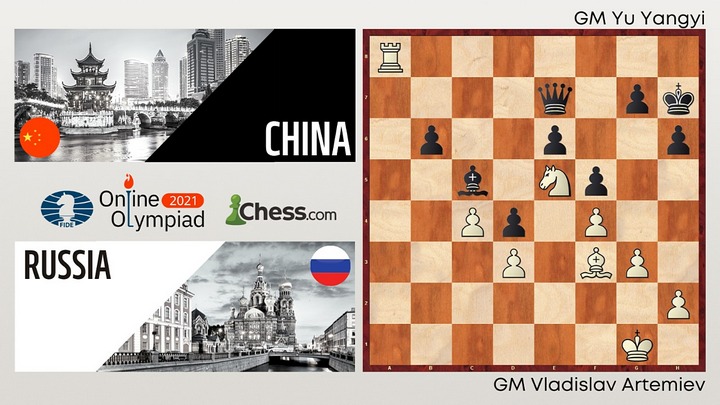
The Chinese GM played 30…Bd6 but after 31.Rh8+! Kxh8 32.Ng6+ Kg8 33.Nxe7 a draw was soon agreed. Instead, 30… Qc7 would have kept the game going.
The other win for the Russian team came from the U-20 junior board Andrey Episenko who also won both of his games, first against Wang Shixu B (demonstrating great endgame technique) and then against Xu Zhihang.
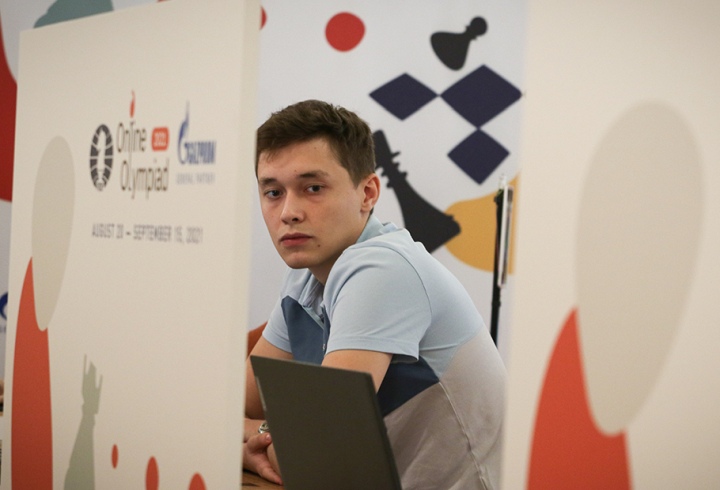 Andrey Esipenko – Photo: Eteri Kublashvili – Russian Chess Federation
Andrey Esipenko – Photo: Eteri Kublashvili – Russian Chess Federation
Episenko is a real find for Russia: although only 19, with his amazing standard rating of 2720, he could have easily defended any of the first two boards.
In the second match, China bounced back with a win by Hou Yifan against Aleksandra Goryachkina, in the bout between the world women’s number one and two, but were unable to win the match due to Dubov’s fantastic attacking victory against Ding Liren, along with the previously mentioned victories by Kosteniuk and Episenko.
 Team China in action – Photo: Liang Ziming
Team China in action – Photo: Liang Ziming
Pairings of the rounds, live games, PGN files and other useful information can be found on the FIDE Online Olympiad website. Please note that all results and standings remain provisional until the fair play panel submit its daily report.
This stage of the event will run from Monday, September 13th (Quarter-finals) to Wednesday, September 15th (Final). Each duel will consist of two matches, and in the event of a tie (each team wins one of the two matches, or both matches are drawn) the tie shall be broken with one 3/2 blitz match, followed by Armageddon if need be.
The games can be followed online on www.chess.com (Events) and on FIDE’s own Youtube channel. Commentators for this stage are GM Daniel Naroditsky, WGM Jen Shahade, WGM Dina Belenkaya, WGM Keti Tsatsalashvili, IM David Pruess and James Canty III.
Text: IM Michael Rahal, FIDE Press Officer
Email: press@fide.com
About the tournament:
Scheduled to take place from August 20th to September 15th, the 2021 FIDE Online Olympiad is a national teams event in which all federations affiliated to FIDE have the right to participate. Team’s consist of six players with a minimum of three female players and two junior players.
Played online on Chess.com, the event features two main stages: the “Divisions stage”, and the Play-offs stage. All games are played with a 15 minutes + 5 seconds increment per move time control. The full schedule can be consulted here.
Organisers:
International Chess Federation (FIDE)
Chess.com as the hosting platform
Partners supporting the 2021 FIDE Online Olympiad:
Shenzhen Longgang District Culture, Radio, Television, Tourism and Sports Bureau
Shenzhen Chess Academy
Shenzhen Pengcheng Chess Club
Shenzhen Longgang District People’s Government
Shenzhen Municipal Bureau of Culture, Radio, Television, Tourism and Sports

